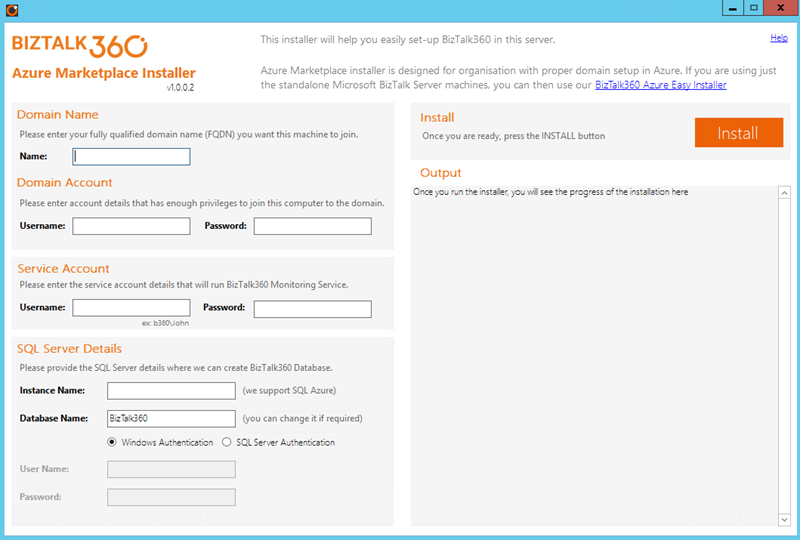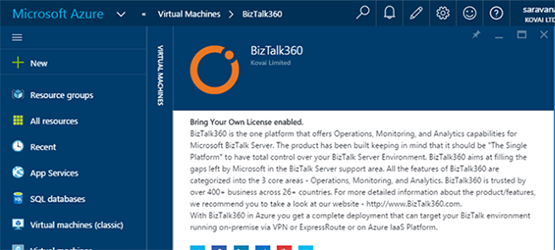About a month ago we introduced
BizTalk360 Azure Easy Installer which allowed anyone to install BizTalk360 on your existing BizTalk Server virtual machines running on Microsoft Azure seamlessly. Using
Easy Installer you can install BizTalk360 by simply executing a single line PowerShell command from your BizTalk VM’s.
Now we are taking a step further by introducing
BizTalk360 in Azure Marketplace a first class citizen that takes advantage of the powerful Azure Marketplace platform. Now anyone who has a Microsoft Azure account and using BizTalk Server in the cloud can take advantage of BizTalk360 by just a few clicks.
The below screenshot shows BizTalk360 integration with Azure Portal. Now the users can simply click on the “
+ New Virtual Machine” link, search for
BizTalk360 and follow the onscreen instruction to provision a brand new BizTalk360 all within the Azure portal.

Background
In the beginning of this year while finalizing for the
BizTalk360 8.0 release one of the things we wanted to achieve was to bring a first class support for BizTalk360 for customers using BizTalk Server in Microsoft Azure. Getting your application into Azure marketplace is not a straight forward process. Microsoft is trying to protect the integrity of the marketplace, hence, ISV’s like BizTalk360 need to go through a very stringent qualification and approval process to get listed on the marketplace.
Azure marketplace offers two different options for ISV’s. Your solution could be a
virtual machine based offering with BYOL (bring your own license) or it could be a
developer service. In the VM based solutions, you prepare a fully configured virtual machine with everything preinstalled and preconfigured and make it available in the marketplace. In the developer services option, you do not provision any VM’s you simply make it easy for customers to take advantage of your solution. The best example is something like SendGrid, where you use their platform to send emails from Azure. In BizTalk360 case, we went down the VM route since that’s the appropriate choice.
At the time of this writing, there are only 660 VM based solutions and 53 developer services available in Azure Marketplace. Here is the process you go through from start to finish to get into Azure Marketplace. It can easily take anywhere from 2 to 4 months to get fully certified if you are lucky enough to get selected.

Why is it important for BizTalk360 to support Azure?
BizTalk Server 2016 release is just around the corner and one of the important updates as part of 2016 release is the full support to run BizTalk Server production workload in the cloud. Currently, there are some limitations to run BizTalk production workload in Azure mainly around supporting a highly available BizTalk environment. BizTalk Server 2016 is bringing support for SQL Server 2016 AlwaysOn, which makes it possible to have a highly available solution in Azure, hence supporting BizTalk server IaaS VM’s to run in Azure for a production configuration. As shown in the below screenshot taken from “
BizTalk Server 2016 What’s New” announcement.

We predict with the official support for BizTalk production environments in Azure customers will start moving their BizTalk infrastructures to Azure gradually (depending on the scenarios), in which case it’s super important for us to support them seamlessly.
Changes we made in BizTalk360 to support Azure marketplace
Once we decided on going down the VM route for BizTalk360, we wanted to make sure the user experience is as seamless as possible for the end customers to start using BizTalk360 on Azure. As I explained earlier, when you are going down the VM route, you need to make sure all the prerequisites are installed on the VM so that the user can simply search for the application within Azure portal, and in few clicks, your solution should start working with as little configuration steps as possible.
One of the challenges we faced with taking BizTalk360 into Azure marketplace is the dependency on SQL database. In order to install and configure BizTalk360, we need a backend SQL database. We were faced with few choices, either to pre-install SQL server in BizTalk360 VM, support SQL instance in the network or allow the user to use SQL Azure. The earlier one was complicated due to SQL server licensing challenges and it will also be an expensive option for end customers. The best option from the customer perspective is to support SQL azure, since being in the cloud
it made sense to support SQL Azure.
Supporting SQL Azure for BizTalk360 is not a straight forward simple connection string change, we had to make changes to the product at multiple places. SQL Azure is a subset of SQL server and there were a lot of limitation in terms of what’s allowed and what’s not allowed. We identified the list of limitation like SQL login creation, clustered index on tables are mandatory, SQL bulk insert is not supported etc. We made necessary changes across the board to work with those limitations and finally we had to make changes to our BizTalk360 installer to support SQL Azure.
All these fundamental changes also mean extensive testing across the board, and this is also one of the contributing factor why BizTalk360 version 8.0 was delayed by at least 3 months.
How did we overcome Azure Marketplace verification turnaround time
One of the biggest challenges we experienced in the process is the turnaround time for your VM to be certified by the Azure team. The process basically goes like this, you prepare your VM with all preconfigured requirements and push it into a staging account (the marketplace VM will show up only within your chosen Azure account). Once you finish the testing, then you push your VM into production, when it gets approved your VM will be replicated across all the datacenters and available for anyone.
This process takes anywhere from 5-10 working days. So for every small change or bug fix the team was losing about a week waiting. In the original design, we installed the latest version of BizTalk360 directly on the VM, which was wrapped by an Azure Marketplace installer that collects some configuration and kicks off the installation.
We changed the process to have only a light weight bootstrapped console application, that will fetch the latest Azure Marketplace installer and latest BizTalk360 installer on the windows startup event and kick off the configuration. This drastically reduced our turnaround time now, we no longer need to go through the full staging/production approval process, instead, we can simply keep pushing new versions behind the scene.
In fact, we released our v 1.0 of BizTalk Azure marketplace on 16th March and kept it quite, since then we released 6 incremental version to fine-tune the user experience and to address some of the bugs we encountered in taking it live.
Difference between BizTalk360 Azure Easy Installer & Azure Marketplace
One of the common questions that arise is why do we have two different offerings of BizTalk360 in Azure?
We have seen two different ways customers use Azure at the moment depending on the maturity level of the organization’s cloud adoption. One set of people simply use Azure as a testing ground, they provision virtual machines randomly and start using it, and the second set where they have maturity in cloud usage, they will have a proper domain setup, virtual network etc.
BizTalk360 Azure Easy Installer supports the first scenario, it is a simple wrapper to seamlessly install BizTalk360 on your existing BizTalk server virtual machine. It’s mainly designed for a standalone BizTalk server installation scenarios.
On the other hand,
BizTalk360 Azure Marketplace is designed for the second scenario, where you have a domain, active directory and one or more BizTalk environments running in the network. In this case, BizTalk360 VM runs independently on its own VM and connects to all the BizTalk environments available in the network.
Licensing cost for BizTalk360 on Azure
The licensing is similar to our on-premise
pricing, you simply pay for each BizTalk environment license and we do not differentiate between BizTalk server running on-prem or cloud. BizTalk360 on Azure marketplace itself is a free offering from us, based on BYOL (bring your own license) concept. However, you need to pay Microsoft for the virtual machine cost depending on the size of the virtual machine you are provisioning. You can see more details about the
BizTalk360 virtual machine pricing published by Microsoft. We recommend using A2 Standard tier, which costs roughly $130/month.
Quick getting started guide
We assume you already have an Azure account, a virtual network configured with a domain controller to get started.
- Login to Azure Portal
- Click on Virtual Machines” link from LHS navigation
- Click on the Add link and type BizTalk360 in the search box and click enter
- You’ll see the BizTalk360 Azure Marketplace VM displayed in the list as shown below

- Select and follow the procedure identical to how you provision any VM in Azure.
- Once the VM is provisioned you connect to it via the RDP connection. During the start-up process, it will automatically download and launch the “BizTalk360 Azure Marketplace installer” as shown below.
-

- You provide the details for domain name, username/password that has enough privilege to add the machine to the domain, a service account username/password under which you wanted to run BizTalk360, the SQL instance name (either the one in the network or SQL Azure) with username/password if required and finally click on the Install button. Please make sure to include the domain name\username for the service account:username details.
- The VM will restart once to join itself to the domain and then continue the installation and will automatically launch BizTalk360.
- Once launched you can then connect to any existing BizTalk environments in the domain using the friendly BizTalk360 user interface.
Why not give it a try?
You are just one click away from provisioning a brand new BizTalk360 VM in Microsoft Azure.




 We predict with the official support for BizTalk production environments in Azure customers will start moving their BizTalk infrastructures to Azure gradually (depending on the scenarios), in which case it’s super important for us to support them seamlessly.
We predict with the official support for BizTalk production environments in Azure customers will start moving their BizTalk infrastructures to Azure gradually (depending on the scenarios), in which case it’s super important for us to support them seamlessly.

